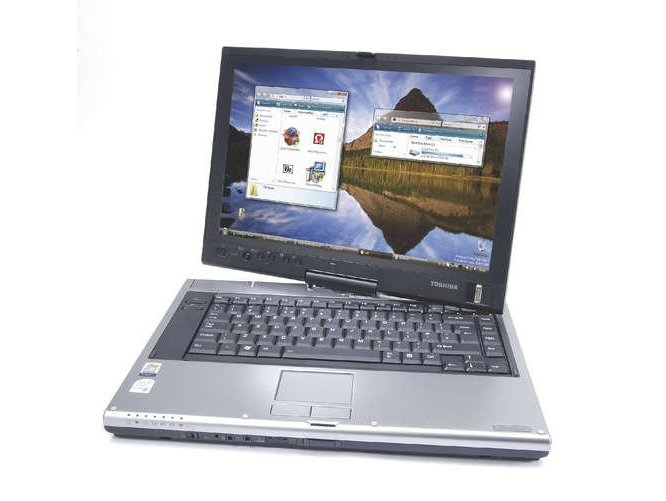TechRadar Verdict
It's flexible and capable, but don't expect to be in the computing fast lane
Pros
- +
WXGA 14.1in TFT active matrix
Gigabit Ethernet
biometric scanner
Cons
- -
Only 512MB RAM
Smallish hard drive
Why you can trust TechRadar
There's no arguing with the concept of the tablet PC. Really, there isn't. The argument we usually attempt to dredge up is one of form factor - these things are perennially too big, too clumsy, too devoid of comfortable input devices - and we're proven wrong by every tablet PC that comes our way.
But our biggest complaint (since we've already lost any sort of argument before starting it) is that there's very little that actually requires such an expensive addition to a laptop. There's really no way to justify it.
Sadly, our debating skills end up trumped yet again, because in many strange ways it's their seemingly uselessness that makes tablets even more attractive. We're always driven to seek out new and exciting ways to use the extra functionality we've been given.
The Tecra M7 is primarily a notebook PC - such a subtle twistable screen hides the tablet portion quite well. It's a mind-bogglingly thin display too, a huge surprise given the extra layer required for tablet functionality.
The hinge gives a clear visual indicator of the direction it needs to be turned in, which is slightly more revolutionary than you might think. By their nature, tablet hinges are spindly, flimsy affairs, and while this has a solid feel to it at the initial stages, it could follow the rest of its kin and weaken considerably if jammed the wrong way a few too many times.
Despite a smooth opening action and the ingenious example of a reversible catch, we also have reservations over the long-term stiffness of the hinge, which gives a noticeable bounce whenever its angle is changed.
Flip it round and clip it down, though, and you do get some impression of the build quality that's on offer here. Toshiba certainly hasn't been messing around. There's a stiffness to the unit as a whole, and absolutely no movement whatsoever when the M7 is configured in slate mode.
Although tablet screens inherently lack physical feedback, making them a little alien to use, Toshiba has come up with something soft yet sturdy enough to make tablet input compelling, at least on the flat. The hinge is a little weak for serious use when propped up.
So what of the internals? We're in a world of slight mediocrity, unfortunately, although Toshiba offers more expensive tooled-up models within the same line. This particular unit was blessed with 512MB RAM (passable, but not outstanding), a piffling little 80GB hard drive, and a Nvidia Quadro card with its very own 128MB of RAM.
And, marvellously for a tablet, the 14.1in screen isn't forced to 1,024x768 resolution to keep up with the tablet digitiser; the M7 offers a vastly improved 1,440x900 instead. In a market consisting of a series of nigh identical tablets, it's nice to see some improvement, but as we've suggested, not everything is fully up to scratch.
There's a Core Duo inside, but it's from the slower end of the range. Then there's the lack of RAM inside. There is a built-in modem, which is perfect for business travel, but you'll probably struggle to find anyone still using a dial-up ISP. Most mobiles provide quicker web access these days, anyway.
Although we're somewhat enamoured with the form factor, perhaps the design could have been better. There are many buttons - and the almost ubiquitous fingerprint scanner - mounted on the screen itself, but a pair of programmable buttons are found to the top left of the keyboard, making them inaccessible in tablet mode.
The flattened screen also covers the speakers, dulling the sound output. Insignificant, definitely and perhaps unavoidable - that the dainty screen would have ended up much thicker if Toshiba had tried to squash a pair of speakers and a few extra buttons in there.
It's the price that really pulls the Toshiba Tecra M7 back into the realms of plausibility. All right, we'll grant you that it's not the fastest machine around, and you won't be cracking out any truly new-fangled games.
But for a fully featured tablet, a shred over a grand is not a bad price to pay, especially when you've got the reassurance of Toshiba's substantial commitment to build quality. We would put the M7 in the same league as any other laptop in its price range, because that extra flexibility - if you can think of a way to use it - is invaluable. Alex Cox
